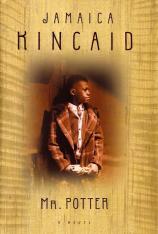Mr. Potter
Review
Mr. Potter
Jamaica Kincaid's lyrical West Indies patois echoes throughout this
bittersweet tale of the father she never knew. As a carefree,
womanizing chauffeur and taxi driver, MR. POTTER, as he is known to
one and all, rambles through a life bereft of emotional
entanglements or responsibilities.
We meet Mr. Potter's father, a man of similar inclinations, who
leaves offspring scattered here and there, who causes a line to be
drawn through Mr. Potter's name in the birth registry as testimony
to his fatherlessness. And we meet his employers, both of whom are
bits of the human flotsam and jetsam washed up on Antigua's shores,
refugees from the mid-20th century upheavals in Europe. Kincaid's
rhythmic prose draws a poignant portrait of the abyss between the
white refugees and the islanders. You see through the disillusioned
eye of the narrator that an understanding of their differences will
never be reached yet they will coexist in some earthly limbo, never
touching one another's lives.
Mr. Potter is introduced as he waits to pick up a new arrival to
Antigua:
"And on that day Mr. Potter drove Mr. Shoul's car to the jetty to
await a large steamer coming from some benighted place in the
world, someplace far away where there had been upheavals and
displacements and murder and terror. Mr. Potter is not unfamiliar
with upheavals and displacements and murder and terror; his very
existence in the world in which he lived had been made possible by
such things, but he did not dwell on them any more than he could
dwell on breathing. And so Mr. Potter met Dr. Weizenger.
"And who was Dr. Weizenger? And just who could answer that question
accurately, or who could answer that question with any
completeness? No one, really, not the same person who could give an
accurate account of any single human being on this earth and all
that they might be made of. Dr. Weizenger could not give an
accurate account of himself, for an accurate account of himself
would overwhelm him."
We meet Mr. Potter's woman friend, Annie, one of many but set apart
in this story because she is the mother of the narrator, who tells
this tale through an eloquent but deep seated rage. Beneath the
musical phrases lie the dark and brooding history that is Antigua.
Mr. Potter is only one link in a long chain of humans who have
suffered injustice, violence, deprivation, illiteracy, and sorrow
brought about by that fateful year of 1492.
The narrator revels in the knowledge that she alone of all of Mr.
Potter's daughters --- whom she recognizes as sisters but never
knows, identified only by their broad noses --- can read and write.
Her mother and her mother's mothers, her father and her father's
fathers could not --- indeed did not care to --- read and write.
The narrator returns to Antigua after her father's death to tell
this story with equal measures of distance and compassion.
Kincaid has shared the pain that is Antigua in several prior books:
THE AUTOBIOGRAPHY OF MY MOTHER, the award winning MY BROTHER, AT
THE BOTTOM OF THE RIVER, ANNIE JOHN, LUCY, and MY GARDEN. Her
stories have appeared in The New Yorker.
Reviewed by Roz Shea on January 22, 2011
Mr. Potter
- Publication Date: May 9, 2002
- Hardcover: 144 pages
- Publisher: Farrar, Straus and Giroux
- ISBN-10: 0374214948
- ISBN-13: 9780374214944











